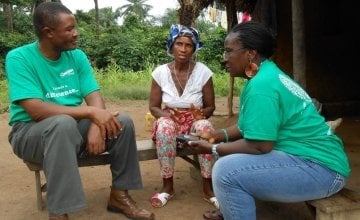
Read our 2024 annual report

Knowledge Hub
Harvesting the power of data: Concern's digital journey

In our ‘thought leadership’ series, Senior Adviser on Monitoring, Planning & Evaluation, Áine Magee, reflects on the potential for data to help transform the lives of the world’s poorest and documents recent developments in Concern’s data journey.
According to the Economist, the world’s most valuable resource is no longer oil, it is data. Data is driving world markets; it is being harnessed to improve sports performance; it is being plundered to influence election results. News headlines are dominated by data related news stories from data breaches across social media to data hacking in financial institutions.
The international development sector must keep up with this data revolution. As actors working in some of the remotest places on earth, with access to the poorest and most vulnerable people, development and humanitarian agencies are in a unique position to generate data and learning about global issues of climate change, poverty, hunger and resilience strategies that could be employed to combat these afflictions. Traditionally, development agencies lag behind commerce in terms of technology. Concern Worldwide is striving to bridge that gap by ensuring that we are part of the digital age when it comes to data collection and use of data across both our development and humanitarian programming.
The Digital Data Revolution
The digital journey began for Concern in 2011 when, with funding from Irish Aid, Concern initiated a Digital Data Gathering (DDG) project with the aim of moving from paper based surveys to a more efficient means of data collection through hand held mobile devices. The surveys in question are large household surveys, usually done at the beginning and end of a specific project. These surveys are used to measure average household characteristics and experiences across a sample of a population at two discrete points in time and to then make a conclusion about the success (or not) of the programme based on that comparison. The utilisation of DDG saw an immediate improvement in data quality in these surveys, as well as more timely access to data.
However, our early experiences did not solve all data related issues in Concern. Collecting and storing data digitally was only the first step in Concern’s digital journey and it was soon revealed that there were many other opportunities to harness the power of technology to increase quality and usefulness of programme data. The most obvious challenge related to data analysis. Whereas data was being collecting quickly using DDG and was stored in an easily accessible Excel format, rendering that data meaningful (and thus useful) required reliance on individual skills in data analysis. Thus it was up to individuals in programme countries to calculate indicator values from data collected and to be able to make inferences about the entire population based on those statistics which are usually taken from a sample – with an obvious consequence being the potential for human error.

Eliminating human error
To address the challenges articulated above, in 2015 Concern refocused our DDG project on automating analysis and reporting on the data that was being collected digitally. In the last 2 years, we have designed standard data collection tools with in-built automatic calculations in order to calculate indicator values based on answers to survey questions. Automatic reports of summary statistics on each survey question are also generated- including summary statistics on those automatic indicator values. This has greatly increased the usefulness of data to Concern field staff. On the spot conclusions can be made regarding programme progress without any need for downloading the data and tasking a busy staff member with doing complex data analysis. This allows swift action to be taken to address any problems revealed.
The IForm Builder system integrates easily with other systems for enhanced reporting and analysis. In Concern, the IForm Builder data feeds into Zoho reports which automatically displays graphical representations of key indicators along with confidence intervals. This allows us to make inferences about the entire population from which the sample was taken, rather than just focusing on the sample statistic. In this way Concern is striving to achieve best practise in data usage and interpretation.
Having a single automated system used throughout 27 Concern countries means a rich and fascinating data base at headquarter level. It is simple to compare key indicators across countries and see where progress is being made- and then investigate why. This facilitates cross country sharing and learning and the potential to scale up successful interventions (and wind down those that are not having an impact).
GDPR
With the dawn of the new General Data Protection Regulation (GDPR), Concern is increasingly concerned about the protection of data we collect, especially in relation to the personal and sometimes sensitive data of the vulnerable people we seek to support. Concern has a Data Protection Policy and associated procedures that ensure we are GDPR compliant.
This is the latest chapter in our digital journey, where we are ensuring all digital data collection forms have consent sections that block access to the remainder of the survey until informed consent of the respondent is received. All personal and sensitive data collected is now being tagged as such, and when the need for that data expires, that data is deleted automatically from Concern’s system to limit the potential for data breaches and limit the risk to our vulnerable programme participants. These steps are just some of the ways that we are striving for excellence in our data collection processes.
Continuing our data journey
Ultimately, the issue of eradicating inequality and creating a socially just world will not be resolved by adopting the latest technological innovation. However data can be used to answer questions, to interrogate assumptions, to challenge the status quo, to increase quality, to know not only that we are doing things right, but that we are doing the right thing.
Moreover, the digital solution Concern employs to collect this data ensures that we meet the highest standards in data interpretation and use, as well as ensuring that we are fully compliant with data protection regulations. Our digital journey will continue as we seek to increase the creation of digital data collection tools, and to further exploit data collected to the maximum benefit of our programme participants.
About the author
Áine Magee is a Senior Planning, Monitoring and Evaluation Adviser for Concern Worldwide, based in Dublin.
Learn more about our world
Learn more about the diversity of our work in 26 countries worldwide.


